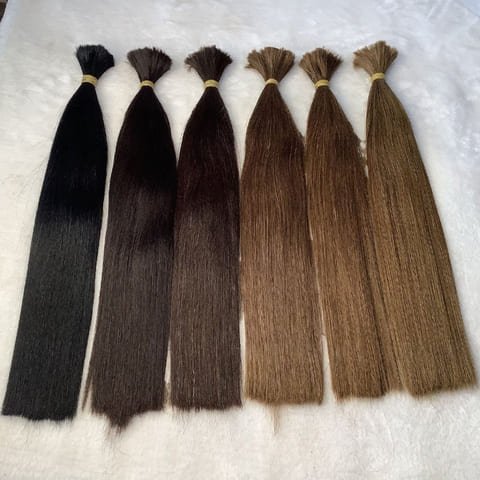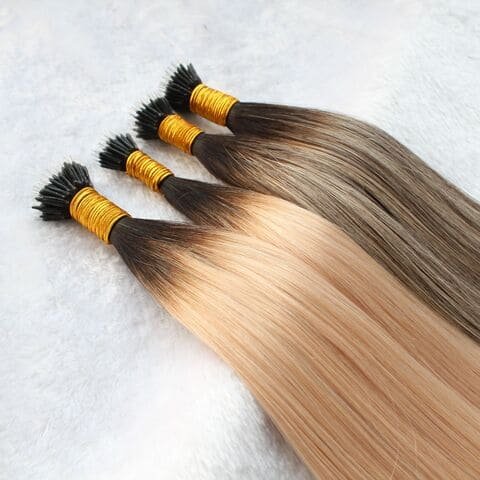Are you worried that getting hair extensions might have damaged your natural hair? You’re not alone. Many women who have tried hair extensions have experienced concerns about the long-term effects on their hair’s health. In this article, we’ll explore the common misconceptions surrounding hair extensions and whether they can cause damage.
Hair extensions can be a fantastic way to add length, volume, and versatility to your hair. However, it’s important to choose the right method and take proper care of your extensions to minimize any potential damage. We’ll discuss the different types of hair extensions available, their application process, and how to maintain them to ensure your natural hair stays healthy.
We’ll also debunk some of the myths about hair extensions wreaking havoc on your hair. While there can be risks if not done correctly, by following expert advice and using top-quality products, you can enjoy the benefits of hair extensions without sacrificing your hair’s integrity.
So if you’ve been wondering whether getting hair extensions has damaged your hair, stay tuned as we uncover the truth and provide you with valuable insights on how to maintain gorgeous and healthy hair, extensions, and all.

Understanding the potential damage of hair extensions
When it comes to hair extensions, it is crucial to understand the potential risks and damage they can cause if not done correctly. One of the primary concerns is traction alopecia, which is hair loss caused by the constant pulling and tension on the hair follicles. This condition is more common with improper application or excessive weight from the extensions.
Another potential risk is damage to the natural hair due to the use of low-quality extensions or improper removal techniques. Cheap extensions can be made from synthetic fibers that can tangle, mat, and even melt when exposed to heat styling tools. Additionally, aggressive removal methods can lead to breakage and thinning of the natural hair.
However, it’s essential to note that these risks can be minimized or avoided altogether with proper application, high-quality products, and regular maintenance. It’s crucial to work with a reputable hairstylist who specializes in hair extensions and follow their advice on the best methods and products for your hair type.

Signs and symptoms of hair damage from extensions
Knowing the signs and symptoms of hair damage caused by extensions is key to addressing any issues promptly. Here are some common indicators that your natural hair may have been damaged by extensions:
1. Hair breakage: If you notice an increase in hair breakage, especially around the areas where the extensions were attached, it could be a sign of damage. Hair breakage can occur due to the weight of the extensions pulling on the hair strands or if the extensions were applied too tightly.
2. Scalp irritation: If you experience persistent scalp irritation, redness, or itchiness after getting hair extensions, it could be a sign of an allergic reaction or improper application. It’s important to address this issue promptly to prevent further damage or discomfort.
3. Thinning hair: Excessive hair shedding or thinning can occur when the extensions are too heavy for your natural hair or if they were attached too close to the scalp. If you notice a significant decrease in hair density, it’s essential to consult with a professional to assess the damage and determine the best course of action.
If you experience any of these signs or symptoms, it’s crucial to seek professional help from a hairstylist who specializes in hair extensions. They can assess the damage and provide guidance on how to address the issue effectively.

Steps to prevent and minimize hair damage from extensions
Prevention is always better than cure when it comes to hair damage from extensions. Here are some steps you can take to minimize the risk of damage and maintain healthy hair with extensions:
1. Choose the right method: Different hair extension methods have varying levels of impact on your natural hair. Research and consult with a hairstylist to determine the best method for your hair type and desired results. Methods like tape-in extensions and micro-link extensions are known to be less damaging compared to methods like sew-in or glued extensions.
2. Prioritize proper installation: Proper installation is crucial to minimize damage. Ensure that the extensions are not applied too tightly, as this can lead to tension and hair breakage. The weight of the extensions should also be distributed evenly to avoid putting excessive strain on your natural hair.
3. Use high-quality extensions: Investing in high-quality extensions is essential for maintaining the health of your natural hair. Synthetic extensions can cause tangles, matting, and damage when exposed to heat styling tools. Opt for human hair extensions, as they can be treated and styled just like your natural hair, reducing the risk of damage.
4. Follow a gentle haircare routine: Proper maintenance is key to preventing damage from extensions. Use a wide-toothed comb or a brush specifically designed for extensions to detangle your hair gently. Avoid pulling or tugging on the extensions when styling or brushing. Additionally, minimize the use of heat styling tools and always use a heat protectant spray to shield your hair from damage.
5. Regular maintenance appointments: Schedule regular maintenance appointments with your hairstylist to ensure that the extensions are in good condition and properly maintained. They can check for any signs of damage, make necessary adjustments, and provide guidance on caring for your extensions.
By following these steps, you can enjoy the benefits of hair extensions without sacrificing the health of your natural hair. Remember, it’s essential to be proactive in preventing damage and seeking professional advice whenever necessary.

Haircare routine for maintaining healthy hair with extensions
Maintaining healthy hair with extensions requires a consistent and gentle hair care routine. Here are some tips to keep your hair and extensions in excellent condition:
1. Washing your hair: Use a sulfate-free shampoo and a nourishing conditioner to wash your hair and extensions. Gently massage the scalp without pulling on the extensions. Avoid washing your hair in hot water, as it can strip the natural oils and dry out your scalp.
2. Conditioning: Apply a leave-in conditioner or a lightweight hair oil to the mid-lengths and ends of your hair to keep it hydrated and soft. Avoid applying conditioner directly to the roots or the attachment points of the extensions, as it can cause slippage or loosening.
3. Brushing: Use a wide-toothed comb or a brush designed for extensions to detangle your hair. Start from the ends and work your way up to avoid tugging or pulling on the extensions. Brush your hair gently and avoid excessive force or pressure.
4. Styling: Minimize the use of heat styling tools to protect your hair and extensions from damage. If you do use heat, always apply a heat protectant spray and use the lowest heat setting possible. Opt for heatless styling techniques like braiding or air-drying whenever possible.
5. Sleeping: Tie your hair in a loose braid or a low ponytail before going to bed to prevent tangling and matting. Consider using a silk or satin pillowcase, as it reduces friction and helps prevent damage to your hair and extensions.
Remember to consult with your hairstylist for specific recommendations based on your hair type and the type of extensions you have. They can provide personalized guidance on the best products and techniques for maintaining healthy hair with extensions.

Professional treatments for damaged hair from extensions
If you’ve experienced significant damage to your natural hair due to extensions, there are professional treatments that can help restore its health. Here are some treatments commonly used to address hair damage caused by extensions:
1. Deep conditioning treatments: Deep conditioning treatments can help nourish and repair damaged hair. Look for treatments that are specifically formulated for damaged or chemically treated hair. These treatments often contain ingredients like keratin, argan oil, or shea butter to restore moisture and strength to your hair.
2. Protein treatments: Protein treatments can help strengthen the hair shaft and repair any structural damage caused by extensions. These treatments typically contain hydrolyzed proteins that penetrate the hair cuticle, filling in gaps and reinforcing weak areas.
3. Scalp treatments: If you’ve experienced scalp irritation or inflammation due to extensions, consider getting a soothing scalp treatment. These treatments can help calm the scalp, reduce redness, and promote a healthy environment for hair growth.
It’s important to consult with a professional hairstylist or trichologist to assess the extent of the damage and determine the most suitable treatment options for your specific needs. They can provide expert advice and tailor the treatments to address your hair’s unique condition.

Conclusion: Taking care of your hair with or without extensions
In conclusion, getting hair extensions doesn’t have to result in damaged hair. By understanding the potential risks, choosing the right method, and following a proper maintenance routine, you can enjoy the benefits of extensions while keeping your natural hair healthy.
Remember to work with a reputable hairstylist who specializes in hair extensions and follow their advice on the best methods and products for your hair type. Regular maintenance appointments are essential to ensure that the extensions are in good condition and properly maintained.
If you do experience any signs or symptoms of hair damage, seek professional help promptly. Addressing the issue early can prevent further damage and help restore the health of your natural hair.
Whether you choose to wear extensions or not, maintaining a gentle haircare routine, using high-quality products, and seeking professional advice when needed are key to keeping your hair healthy and beautiful. So go ahead and rock those extensions with confidence, knowing that with proper care, your hair can stay gorgeous and damage-free.




